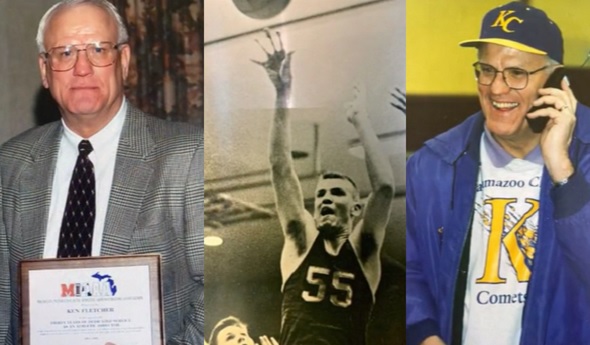
K-Christian's Fletcher Brought Calm, Kindness
October 13, 2020
By Geoff Kimmerly
Second Half editor
The calm in a storm. The rock, no matter how bad things would get.
That’s how longtime athletic administrator Karen Leinaar described Ken Fletcher, who served as director of Kalamazoo Christian’s athletic department for three decades and was among those from the Kalamazoo Valley Association who mentored Leinaar when she served at Delton Kellogg during the 1980s and 90s.
Fletcher died Sept. 25 at age 77.
He had spent 40 years total in education, also as a teacher and coach, before retiring in 2006.
“Anytime we had an issue in the league, he was the calming voice, he was the voice or reason,” said Leinaar, now athletic director at Bear Lake and executive director of the Michigan Interscholastic Athletic Administrators Association. “Being a mathematician, he was a very logical thinker – but he had the compassion of a priest.
“You never saw Ken disheveled. You never saw Ken frustrated. He always had a smile and kind word for everybody – it didn’t matter the color of their uniform or if it was an official or spectator.”
Fletcher had graduated from Kalamazoo Christian in 1961 and was part of the boys basketball team that won the Class C championship in 1959. He went on to Calvin College (now Calvin University), where he majored in mathematics and earned a degree in education, and also continued his basketball and baseball careers. He later received master’s degrees in in athletic administration from University of Michigan and mathematics from Western Michigan University.
Kalamazoo Christian’s boys basketball team also won Class C championships in 1983 and 2001 during Fletcher’s AD tenure. But Leinaar noted that Fletcher was a great advocate as well for the school’s girls programs, which often were more frequently successful – the softball team, for example, won six MHSAA Finals titles over seven seasons from 1996-2002. “He just loved kids,” she added.
Fletcher was named his region’s Athletic Director of the Year by the MIAAA in 1989.
He is survived in part by his wife of 56 years, Judy, three children and 14 grand- and great-grandchildren. Click to view Fletcher’s full obituary.
PHOTOS collected by the Fletcher family.

The More Things Change ...
December 20, 2013
By Rob Kaminski
MHSAA benchmarks editor
As we begin another calendar year, let's take a brief look at how the mission of school sports has (or hasn’t) changed since 1955, when former MHSAA Executive Director Charles E. Forsythe presented this practicum to the University of Michigan.
The following is an excerpt:
Presented by Charles E. Forsythe
Practicum in Physical Education
University of Michigan, Ann Arbor
Tuesday, June 21, 1955
WHY DO WE HAVE INTERSCHOLASTIC ATHLETICS IN OUR SCHOOLS?
 To meet the urge for competition which is a basic American tradition – let’s keep it.
To meet the urge for competition which is a basic American tradition – let’s keep it.- To provide a “whole school” interest and activity, bring in students other than athletes, enlist many student organizations.
- To teach students habits of health, sanitation, and safety.
- Athletics teach new skills and opportunities to improve those we have; this is basic educationally.
- To provide opportunities for lasting friendships both with teammates and opponents.
- To provide opportunity to exemplify and observe good sportsmanship which is good citizenship.
- Athletics give students a chance to enjoy one of America’s greatest heritages, the right to play and compete.
- One of the best ways to teach that a penalty follows the violation of a rule is through athletics.
- There must be an early understanding by students that participation in athletics is a privilege which carries responsibilities with it. Awarding school letter to a student is the second-highest recognition his school can give him – his diploma at graduation is the highest.
- To consider interscholastic athletic squad as “advanced” classes for the teaching of special skills – similar to bands, orchestras, school play casts, members of debating teams, etc. There is no reason why a reasonable amount of attention should not be given to such groups – as well as to those in the middle and lower quartiles in our schools. Both leaders and followers must be taught.
PHOTOS: (Top) Fans filled the arena for this MHSAA boys basketball tournament game. (Middle) Charles Forsythe served as the first executive director of the MHSAA.

